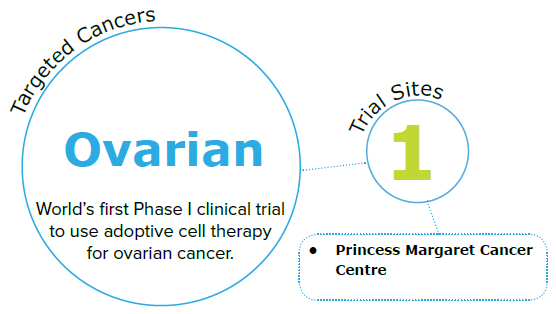Evaluating adoptive cell therapy to treat ovarian cancer using TILs conditioned with dendritic cells
Key Information
Recruitment status
- Not recruiting (closed)
Key words
- Ovarian, TILs, made in Canada

About the Trial
Ovarian cancer is the fifth most deadly cancer in women and the most lethal gynecologic malignancy. Surgery and chemotherapy are currently the standard treatments, but the death rate for this cancer remains very high. This trial brings an innovative biotherapeutic approach that uses a population of cells from the immune system, called T cells, to treat this deadly disease.
T cells are white blood cells that have the ability to seek out and destroy tumours. The T cells found within a tumour are called tumour-infiltrating lymphocytes, or TILs. Known as adoptive cell therapy, this approach to cancer treatment takes a patient’s own TILs and re-activates them in the laboratory before giving them back to the patient. This therapy has been tested in patients with metastatic melanoma and shows promise, serving as a catalyst to test it in ovarian cancer.
The team at UHN’s Princess Margaret Cancer Centre has developed a novel method to increase the activity of TILs in the laboratory. As a result, this project will be a first-in-human clinical study on two fronts. It will evaluate this innovative method of activating TILs and will also be the first to use TIL therapy for ovarian cancer, specifically platinum-resistant ovarian cancer.
This study aims to serve as a basis for further clinical development of this “made in Canada” approach to TIL therapy and to determine its potential effectiveness as a therapy for what has traditionally been a very difficult cancer to treat. A key component of this project will be training investigators, from across Canada, how to they can perform TIL therapy at their hospitals.

